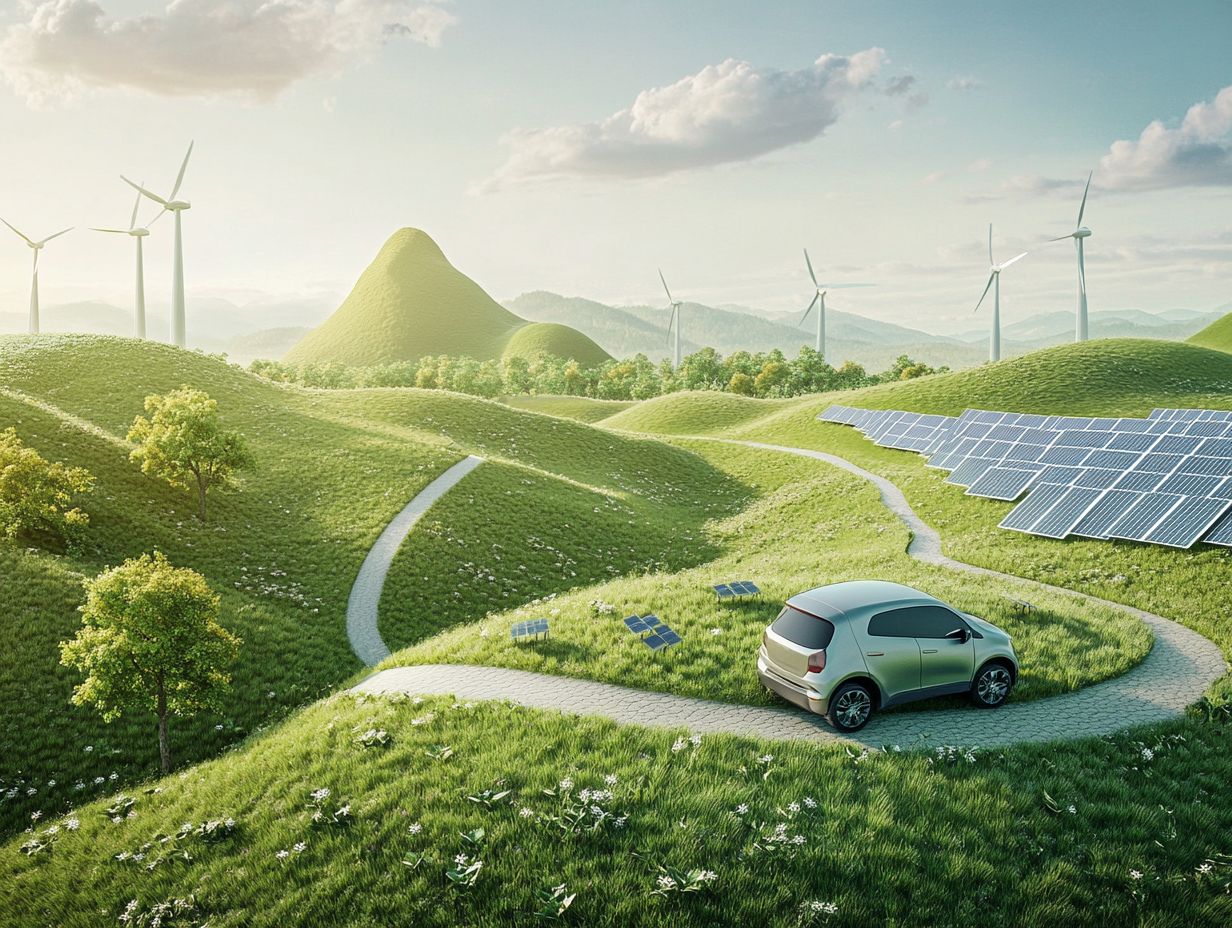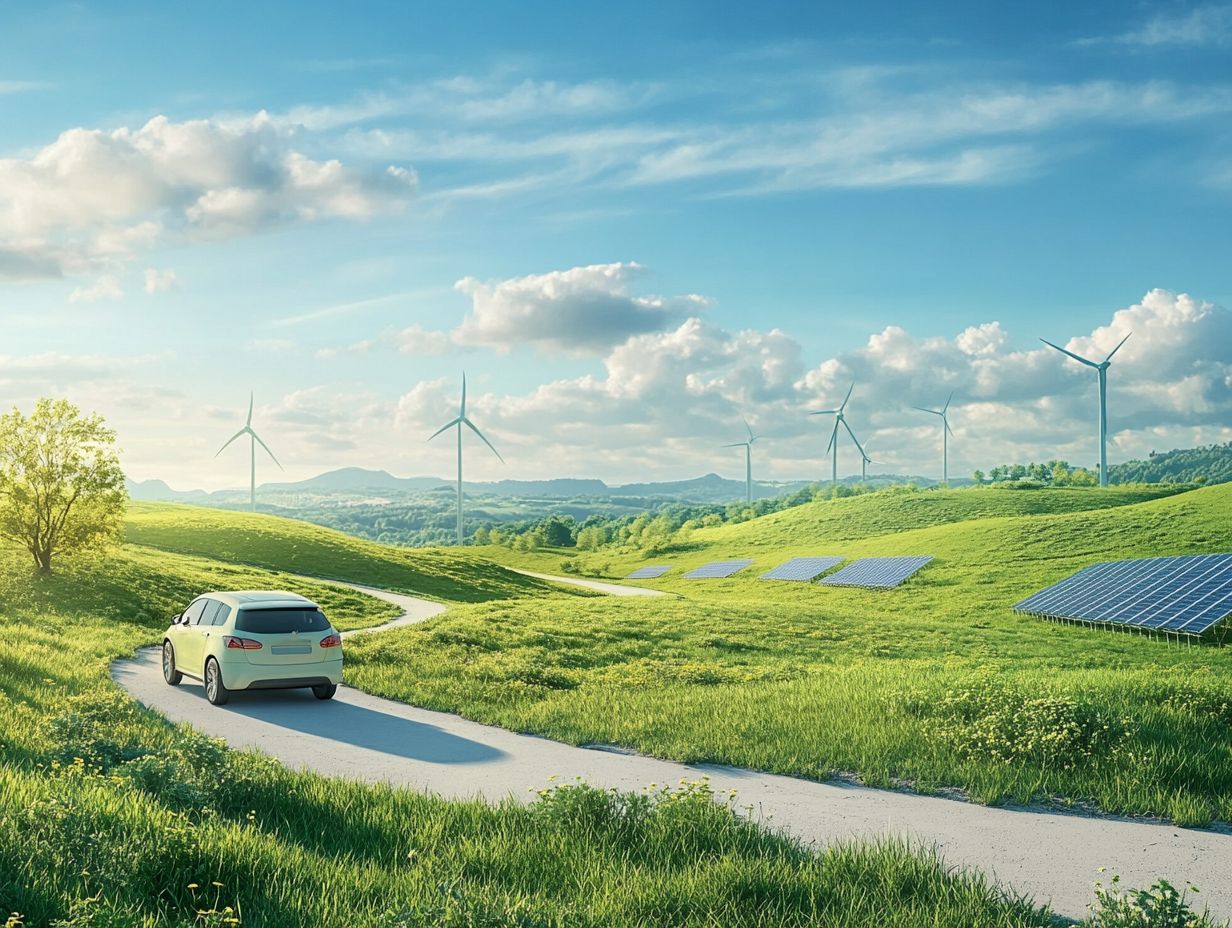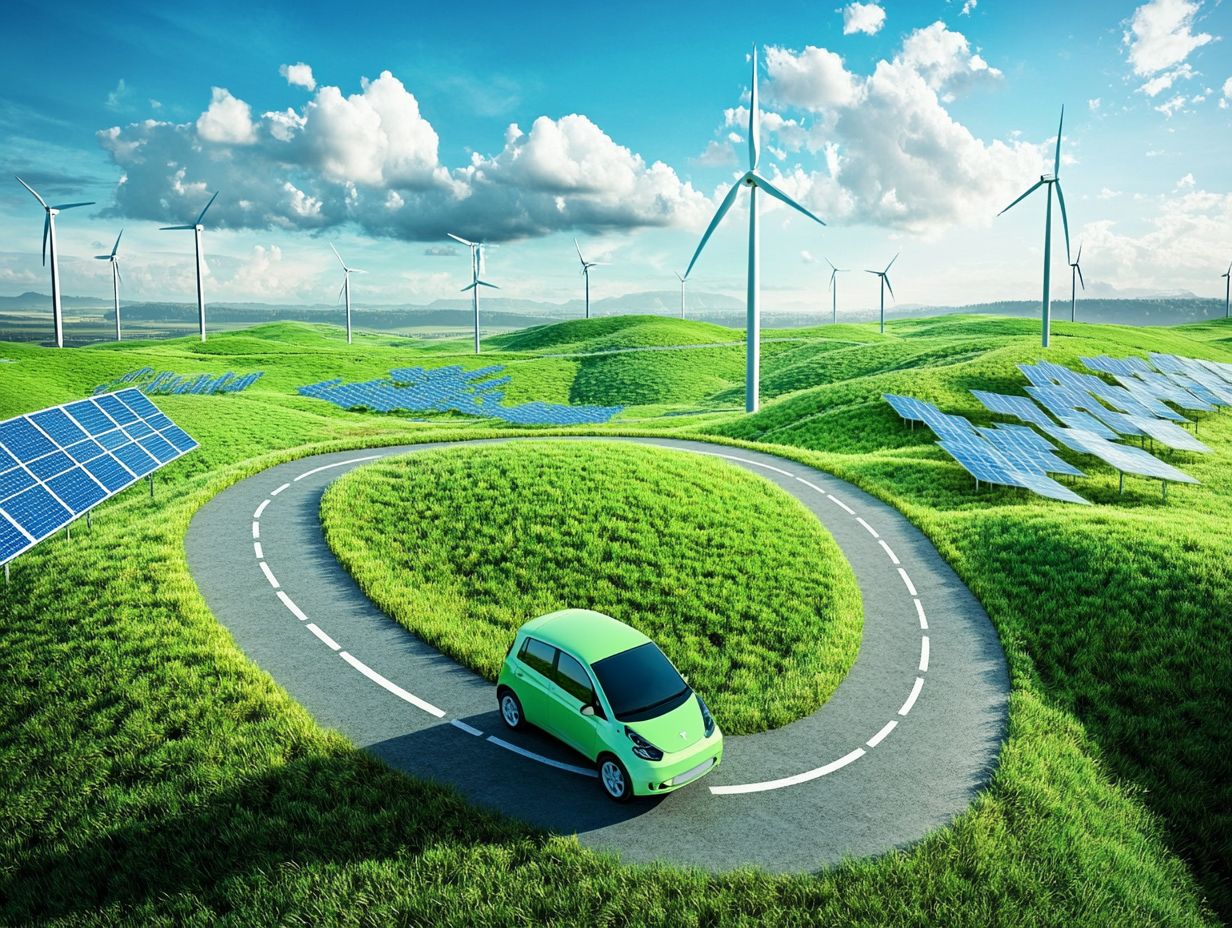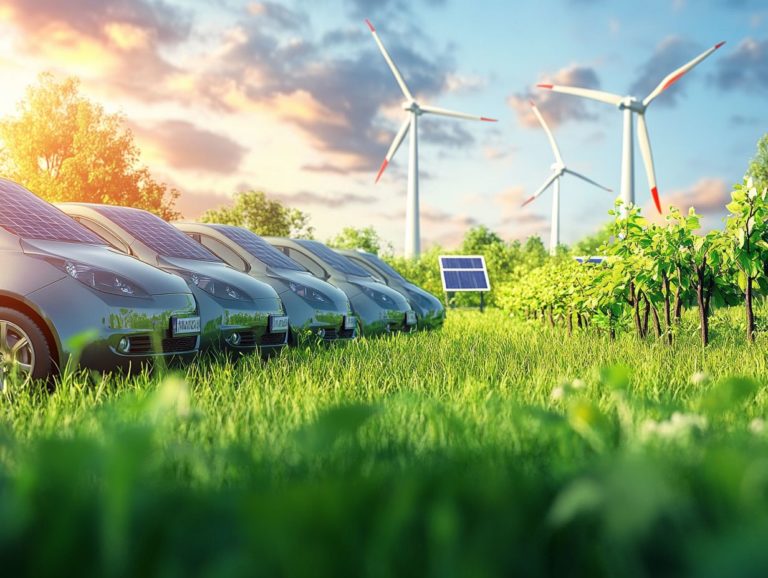5 Reasons Why EVs Are Better for the Planet
Electric vehicles (EVs) are not merely a passing trend; they signify a profound transformation toward sustainability and environmental stewardship.
Consider these five compelling reasons why you should embrace EVs for the planet, ranging from reduced greenhouse gas emissions to a decreased reliance on fossil fuels.
This exploration will compare EVs to traditional gasoline vehicles, delving into their environmental advantages and potential drawbacks while discussing how you can play a role in their widespread adoption.
Together, let s envision the future of electric vehicles and their transformative impact on our world.
Contents
- Discover Key Benefits of Electric Vehicles:
- 1. Reduced Greenhouse Gas Emissions
- 2. Decreased Dependence on Fossil Fuels
- 3. Lower Air Pollution Levels
- 4. Improved Energy Efficiency
- 5. Reduced Noise Pollution
- What Are the Different Types of Electric Vehicles?
- How Do Electric Vehicles Compare to Traditional Gasoline Vehicles?
- What Are the Environmental Benefits of Electric Vehicles?
- What Are the Potential Drawbacks of Electric Vehicles?
- How Can Governments and Individuals Encourage the Adoption of Electric Vehicles?
- What Is the Future of Electric Vehicles and Their Impact on the Planet?
- Frequently Asked Questions
Discover Key Benefits of Electric Vehicles:

- EVs reduce greenhouse gas emissions, helping to fight climate change.
- By relying less on fossil fuels, EVs decrease our dependence on non-renewable resources and reduce carbon emissions.
- EVs contribute to lower air pollution levels, improving overall air quality and creating healthier environments.
1. Reduced Greenhouse Gas Emissions
The adoption of electric cars plays a crucial role in reducing greenhouse gas emissions, significantly lowering the carbon footprint that traditional gasoline vehicles leave behind.
As places like California advocate for cleaner alternatives, the positive effects of the technology behind electric cars are unmistakable in the fight against climate change.
This transition tackles vehicle emissions and paves the way for a sustainable future by promoting electric motors that generate zero tailpipe emissions, ultimately improving air quality in urban environments.
Recent studies show that electric vehicles can slash greenhouse gas emissions by as much as 50% compared to conventional cars, especially when charged with renewable energy sources.
This impressive reduction stems from the efficiency of electric motors, which convert over 77% of electrical energy from the grid into usable power at the wheels.
Various government initiatives, such as tax rebates and the development of charging station infrastructure, are pivotal in accelerating the shift toward electric mobility.
As these policies gain momentum, they create a supportive environment for increased adoption rates of electric vehicles, further bolstering the global movement for a cleaner tomorrow.
2. Decreased Dependence on Fossil Fuels
The rising popularity of electric cars enhances energy security and paves the way for a sustainable energy future through renewable sources and hydrogen fuel alternatives.
By harnessing clean energy from solar and wind, electric vehicles help lower emissions and facilitate a transition from traditional energy consumption.
Hydrogen fuel stands out as a promising complementary technology, providing a clean energy solution generated from renewable resources.
This synergy between electric vehicles and hydrogen enhances the efficiency of transportation systems, allowing them to work together to create a more flexible and resilient energy landscape.
Ultimately, this collaboration drives down carbon footprints while bolstering a greener economy.
3. Lower Air Pollution Levels
Electric cars are celebrated as clean air vehicles that play a crucial role in reducing air pollution, especially in busy cities.
By emitting no tailpipe pollutants, they significantly lower overall vehicle emissions.
The rise in electric vehicle adoption has yielded impressive results. For instance, in California, stringent EV policies have contributed to a reported 10% reduction in nitrogen dioxide levels.
By helping to meet air quality standards set by authorities, these vehicles are vital to enhancing public health.
Cleaner air is directly linked to fewer respiratory illnesses and cardiovascular issues.
Research shows that transitioning to electric mobility could prevent thousands of premature deaths each year, underscoring the profound benefits cleaner transportation offers to communities aiming for healthier environments.
Join the electric vehicle revolution today for a better tomorrow!
4. Improved Energy Efficiency

Electric vehicles offer a remarkable leap in energy efficiency compared to traditional gasoline vehicles. This improvement comes from their advanced electric motors and optimized battery life, leading to superior fuel economy and lower energy consumption.
Consider this: electric motors convert over 60% of electrical energy from the grid into power at the wheels. In contrast, internal combustion engines only achieve about 20% efficiency in turning fuel into movement. This striking difference highlights the transformative potential of electric propulsion systems.
Thanks to advancements in battery technology, especially lithium-ion batteries, storage capacity has significantly improved, and charging times have drastically decreased. This evolution leads to even greater energy efficiency. The regenerative braking system captures energy usually lost during braking and uses it to recharge the battery. So, with electric vehicles, you re not just looking at a greener mode of transport; you re witnessing exceptional performance in terms of cost per mile.
5. Reduced Noise Pollution
One of the overlooked benefits of electric cars is their remarkable ability to significantly diminish noise pollution in urban settings. The silent operation of electric motors stands in stark contrast to traditional combustion engines.
Reducing noise pollution improves public health and enhances overall quality of life. Excessive noise has been linked to various health concerns, including heightened stress levels, sleep disturbances, and even cardiovascular issues. A study by the European Commission revealed that cities enforcing stricter vehicle noise regulations experienced a 20% decline in hypertension cases among residents.
As cities increasingly adopt electric vehicles, experts estimate that urban noise levels could drop by nearly 10 decibels. This shift would create a more tranquil environment, promoting better mental and physical well-being for everyone.
What Are the Different Types of Electric Vehicles?
Electric vehicles (EVs) come in various types, each featuring unique advantages and technologies. You ll find battery electric vehicles (BEVs), hybrid electric vehicles (HEVs), and hydrogen fuel cell vehicles, all designed to meet different consumer needs and preferences.
Understanding the operational differences among these categories is key for making informed decisions. BEVs rely solely on electric power stored in batteries. This means you enjoy zero tailpipe emissions and lower operating costs, although you may face some limitations with recharging infrastructure.
In contrast, HEVs combine traditional combustion engines with electric propulsion, enhancing fuel efficiency while alleviating concerns about running out of power. Meanwhile, hydrogen fuel cell vehicles generate electricity on demand from hydrogen, offering quick refueling options and an impressive range. However, they do face challenges in fuel production and distribution.
Together, these electric vehicle types play a significant role in reducing carbon footprints, promoting energy independence, and fostering innovation in the transportation sector. Together, they are paving the way for a cleaner, greener future for all!
How Do Electric Vehicles Compare to Traditional Gasoline Vehicles?
When you compare electric vehicles to traditional gasoline cars, the differences in fuel costs, maintenance expenses, and carbon emissions become strikingly evident. This highlights the financial and environmental benefits of making the switch to electric.
Electric vehicles typically offer significantly lower fuel costs. The price of electricity per mile is much more economical than gasoline.
Maintenance expenses are generally lower since electric vehicles have fewer moving parts that require servicing. This not only extends the vehicle’s lifespan but also saves you money over time.
From an environmental perspective, electric vehicles produce zero tailpipe emissions. This results in cleaner air quality and a reduction in greenhouse gas emissions, highlighting 5 ways electric vehicles are changing communities.
This benefit is further amplified by the potential to charge using renewable energy sources, making them a sustainable choice and a crucial element in the pursuit of greener transportation solutions.
What Are the Environmental Benefits of Electric Vehicles?

Electric vehicles offer many environmental advantages, such as a reduced carbon footprint and lower greenhouse gas emissions, which foster cleaner air. For those considering a new vehicle, exploring 5 reasons to consider electric SUVs in 2024 can be beneficial.
In urban settings, these vehicles can markedly enhance air quality. They do this by curtailing the pollutants that contribute to smog and various respiratory concerns.
For example, a study carried out across several major cities revealed that embracing electric vehicles could lead to a remarkable 20% reduction in nitrogen oxides, a key player in urban air pollution.
Their role in combating climate change is crucial. Research suggests that if electric vehicle adoption were to triple by 2030, it could help slash greenhouse gas emissions by as much as 30 million tons each year.
These impressive numbers show just how powerful electric vehicles can be for our planet, not just for urban landscapes but also in supporting sustainable development goals related to global climate initiatives.
What Are the Potential Drawbacks of Electric Vehicles?
While electric vehicles offer a plethora of advantages, it’s important to weigh some potential drawbacks. These include battery life concerns, the environmental impact of lithium mining, and the availability of charging stations.
Regarding battery life, researchers are hard at work developing new types of batteries that are expected to last longer and charge faster.
As the automotive industry evolves, the environmental implications of lithium mining are being addressed through innovative recycling methods and the exploration of alternative materials.
Charging infrastructure is expanding significantly, with both public and private initiatives focused on increasing the number of charging stations. This enhances convenience for users.
These ongoing advancements elevate the appeal of electric vehicles and address the concerns shared by potential buyers. This makes the transition to electric a more sustainable and attractive option.
How Can Governments and Individuals Encourage the Adoption of Electric Vehicles?
You can play a pivotal role in promoting the adoption of electric vehicles alongside governments. Take advantage of incentives such as federal tax credits, participate in initiatives like the Clean Vehicle Rebate Project, and engage in public awareness campaigns focused on energy security.
These measures act as catalysts for change, transforming electric vehicles into not just an eco-friendly choice but also a financially appealing one.
By supporting policies that reduce registration fees and expand charging infrastructure, you can help ease the transition for consumers.
Educational programs in your community are essential. They help residents understand the benefits and technologies of electric vehicles.
By participating in workshops and interactive events, you foster a sense of ownership and enthusiasm around this shift.
Now is the time to embrace electric vehicles and enjoy their many benefits! Collectively, these efforts create a supportive environment that enables you and other consumers to make informed decisions, ultimately boosting the overall adoption rate.
What Is the Future of Electric Vehicles and Their Impact on the Planet?
Get ready! The future of electric vehicles is here, and it s brighter than ever. Initiatives like Biden s plan are accelerating their adoption.
Countries like Norway and the UK have set ambitious targets to reduce carbon emissions through more EV usage.
These measures highlight the urgency of transitioning to cleaner transportation and signal a broader shift toward sustainable practices globally. As innovative technologies evolve think enhanced battery efficiency and improved charging infrastructure the appeal of electric vehicles becomes increasingly irresistible.
Supportive regional policies provide financial help and tax incentives. These encourage you to choose electric options.
In this rapidly transforming landscape, market projections indicate that electric vehicle sales are set to dominate in the coming decades. This shift will revolutionize the automotive industry and help reduce global dependence on fossil fuels, playing a crucial role in the fight against climate change.
Frequently Asked Questions

What are the five reasons why EVs are better for the planet?
Here are five key reasons: reduced carbon emissions, improved air quality, less reliance on fossil fuels, potential for renewable energy use, and lower noise pollution.
How do electric vehicles reduce carbon emissions?
EVs emit significantly less carbon dioxide compared to gas-powered vehicles because they do not use fossil fuels. This helps mitigate the negative impact of transportation on the environment and climate change, making them a great choice for those considering the 5 reasons to buy an electric vehicle in 2024.
How do EVs improve air quality?
Electric vehicles do not produce tailpipe emissions, major contributors to air pollution. By switching to EVs and implementing ways to promote sustainability in EV usage, we can reduce the amount of harmful pollutants in the air, leading to healthier and cleaner cities.
How do EVs decrease our reliance on fossil fuels?
Electric vehicles use electricity as their primary energy source, which can be generated from renewable sources like solar or wind power. By reducing our dependence on fossil fuels for transportation, we help preserve these valuable resources for future generations.
Can EVs use renewable energy sources?
Yes, EVs can use renewable energy sources such as solar or wind power to charge their batteries. This makes them even more environmentally friendly and sustainable compared to gas-powered vehicles.
How do EVs reduce noise pollution?
EVs run much quieter than traditional gas-powered vehicles, significantly reducing noise pollution in urban areas. This positively impacts both human health and the environment, and how electric vehicles can help save the planet is an important consideration as we move towards greener alternatives.



